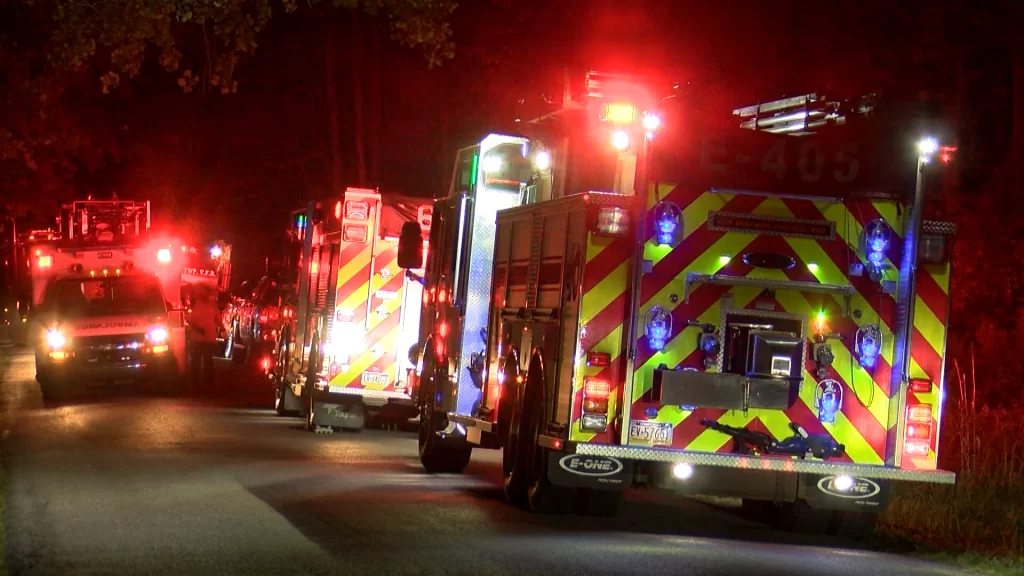
Federal regulators confirmed Saturday they are reviewing the crash of a semitruck carrying a toxic substance in central Illinois, resulting in “multiple fatalities” and dangerous air conditions that prompted the evacuation of area residents.
Jennifer Gabris, a spokesperson for the National Transportation Safety Board, said the agency is investigating the incident that occurred near Teutopolis.
Firefighters, police and other emergency responders who converged on the scene late Friday were still on site Saturday to try to contain the cloud of anhydrous ammonia that emanated from the overturned tanker.
“We have a lot of brave firemen, EMT, hazmat specialists, police officers that are working on this scene as we speak,” Effingham County Sheriff Paul Kuhns said at a Saturday press conference.
Authorities did not say exactly how many people were killed or injured.
Illinois State Police spokesperson Melaney Arnold said authorities initially thought there were five fatalities, but that turned out to be a premature determination amid the early confusion.
The accident caused “a large plume, cloud of anhydrous ammonia on the roadway that caused terribly dangerous air conditions in the northeast area of Teutopolis,” Kuhns said. “Because of these conditions, the emergency responders had to wait. They had to mitigate the conditions before they could really get to work on it, and it was a fairly large area.”
Although not strong, crews working overnight struggled against shifting wind.
“The wind changed three or four different times on us,” said Tim McMahon, chief of the Teutopolis Fire Protection District. “That’s another reason we got crews out in different places, reporting back on which way the wind’s going.”
The accident, which involved “multiple” vehicles including the tanker, happened about a half-mile east of Teutopolis on U.S. Highway 40 on Friday at about 9:25 p.m., Illinois State Police said in an emailed statement.
McMahon said the tanker began leaking after rolling over in a ditch. He said authorities are still preventing cars from driving in that area. Residents within a one-mile radius of the spill — largely on the east end of Teutopolis — were evacuated. The town of 1,600 people is about 110 miles (177 kilometers) northeast of St. Louis.
Kuhns said he did not have information on whether the deaths were the result of the crash itself or the chemical leak. But he said that “the accident scene was large.”
Complicating matters was that an accident on Interstate 70 earlier Friday forced a detour of traffic east along U.S. Highway 40, which bisects Teutopolis.
Anhydrous ammonia is used by farmers to add nitrogen fertilizer to the soil, and it’s also used as a refrigerant in the cooling systems of large buildings such as warehouses and factories. According to the American Chemical Society, it is carried around the United States by pipeline, trucks and trains.
In 2019, dozens of people were sickened in suburban Chicago after the valves were left open on tanks of anhydrous ammonia being transported from a farm in Wisconsin to one in Illinois, creating a toxic gas cloud and sickening dozens of people. Seven people were initially hospitalized in critical condition after a leaking anhydrous ammonia tank pulled by a tractor released the plume over the northern Chicago suburb of Beach Park.
And in 2002, a train derailment released anhydrous ammonia in Minot, North Dakota, killing one man and hundreds of other people reported injuries including burns and breathing problems.
“It’s terrible. It’s bad stuff if you are involved in breathing it, especially because it gets in your airways, in your lungs and it burns,” Kuhns said.
In addition to having a commercial driver’s license, the person behind the wheel of a toxic-substance tanker must study further and successfully complete a test for a hazardous material endorsement, said Don Schaefer, CEO of the Mid-West Truckers Association.
“Once you get that endorsement, there are no restrictions — unless otherwise posted — on hauling hazardous materials on a public highway,” Schaefer said. “But you’re subject to higher scrutiny.”
As of midday Saturday, the accident scene was still heavily blockaded. Kuhns apologized for any inconvenience from the investigation and the evacuation.
“I understand how frustrating that would be to not be allowed to travel or to go back home, but we really need to focus our resources on the spill and on the situation,” Kuhns said. “So if people can have as much patience, that’s what I would ask for.”
___
Slevin reported from Denver. Associated Press writers Pamela Sampson in Atlanta and Kathleen Foody in Chicago contributed.







